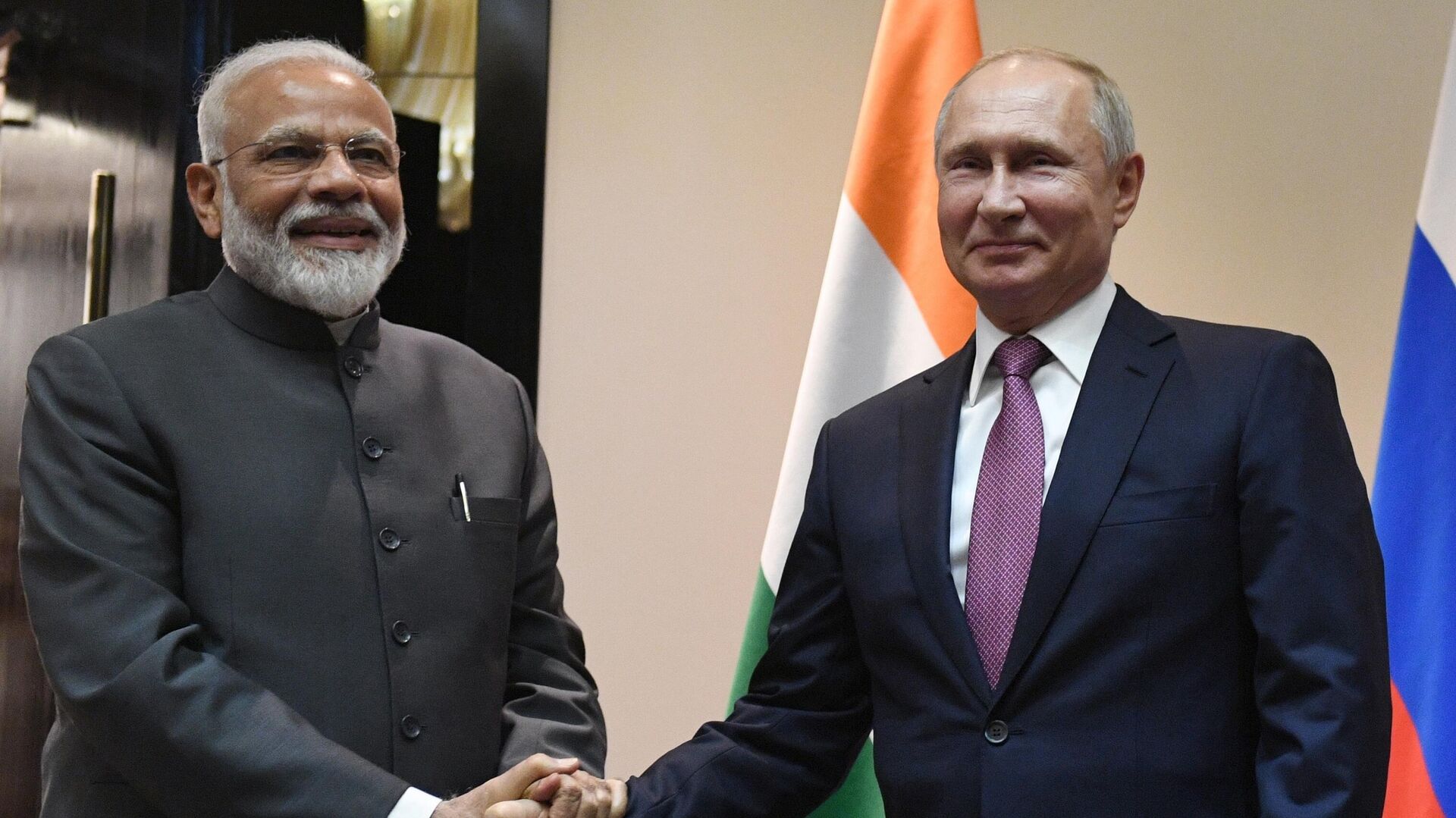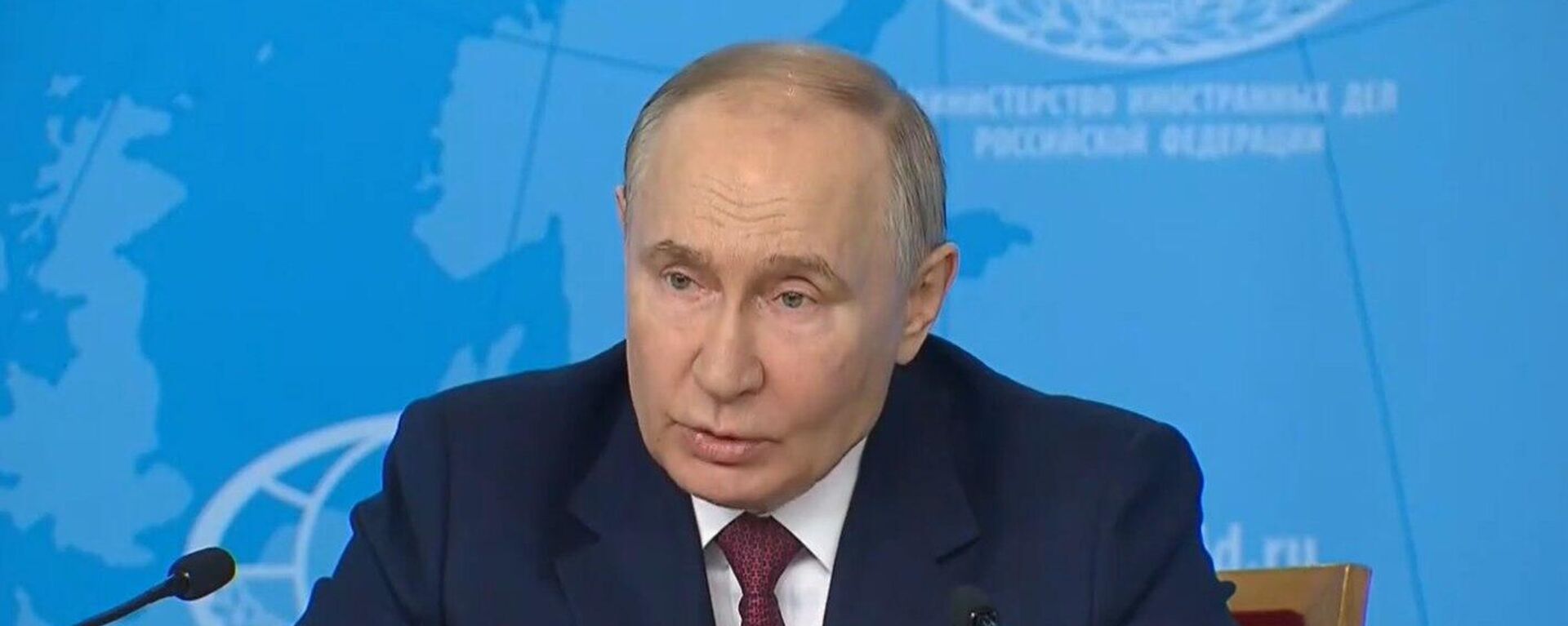https://sputniknews.in/20240614/india-doesnt-recognise-g7-sanctions-experts-on-japans-threat-7625123.html
India Doesn't Recognise G7 Sanctions: Experts on Japan’s Threat
India Doesn't Recognise G7 Sanctions: Experts on Japan’s Threat
Sputnik India
Japanese Prime Minister Fumio Kishida told the G7 Summit in Italy on Thursday that Tokyo was considering a new sanctions passage which would entail targeting entities in "third countries" for circumvention of sanctions, according to an official statement.
2024-06-14T21:28+0530
2024-06-14T21:28+0530
2024-06-14T21:40+0530
sputnik opinion
india
new delhi
g7
fumio kishida
japan
narendra modi
western sanctions
sanctions
collective west
https://cdn1.img.sputniknews.in/img/07e7/07/12/3059144_0:0:3038:1708_1920x0_80_0_0_38646b1946dcac519fbc72228218195f.jpg
India has never been in favour of one-sided restrictive measures, a former diplomat shared the country's position with Sputnik India regarding Japan's new package of sanctions against "third countries" companies that allegedly circumvent anti-Russian restrictions imposed due to the Ukraine situation.Prime Minister Fumio Kishida told the G7 Summit in Italy on Thursday that Japan was considering a new sanctions passage that would entail targeting entities in "third countries" for circumvention of restrictions, according to an official statement. According to the country's Ministry of Foreign Affairs statement, these measures would take aim at entities in China, India, the United Arab Emirates (UAE), Uzbekistan and Kazakhstan.Commenting on the development, former Indian Ambassador Anil Trigunayat, currently a Distinguished Fellow at New Delhi-based think tank Vivekananda International Foundation (VIF), told Sputnik India that the country has never been in favour of one-sided restrictions.He said that it was up to the Japanese government to "make its own assessment" of the situation in view of an expanding strategic bilateral relationship with India."Any decision and its implications are the remit of a sovereign government," Trigunayat underscored.Meanwhile, Manish Chand, a foreign policy expert, publisher and the founder-CEO of the Centre for Global India Insights (CGII), underlined that New Delhi has always viewed the policy of unilateral sanctions as being "counter-productive" to their original purpose. In this light, India has always maintained that sanctions impact ordinary people in the targetted country, and it has been the nation's standard position, the think-tank said.Talking to Sputnik India from the G7 Summit in Italy, Chand highlighted that the focus of the Western bloc was to prop up a "collective, combined effort to impose further sanctions against Russia". He further remarked that the G7 club was "ganging up" on Russia.The analyst also noted that the country had not only refused to comply with Western sanctions, but had also resisted pressure to downgrade its ties with Moscow. Chand assured that India would not be a party to the new round of sanctions announced by G7 countries, as this is not conducive to peace.He added that New Delhi’s focus was on "balancing its ties between the West and Russia, part of a multi-alignment foreign policy approach under Prime Minister Narendra Modi.'Too Much at Stake for Japan'At the same time, Chand claimed that there was simply too much at stake for Japan as far as the bilateral relationship with India is concerned.He underlined that Japan had its "own perspective on the Ukraine crisis", aligning its position with that of G7. The panelist mentioned that Modi had also conveyed India's position on the conflict to Prime Minister Fumio Kishida during his visit to New Delhi for the annual summit in 2022.Similarly, during Kishida's visit to New Delhi in 2022, Japan committed to public and private investments of nearly $42 billion in India till 2027, according to a joint statement.The ‘Special Strategic and Global Partnership' between the two states involves collaboration across an array of sectors, more importantly in investments, development, automobiles and railways, science and technology and joint projects in third countries, including South Asia.However, Chand expressed confidence that New Delhi would find a way around the third-party sanctions.'A Lot of Pressure on India to be Present at Swiss Summit'Regarding India's participation at the "highest level" at the Peace Summit on Ukraine scheduled to take place in the Swiss resort of Bürgenstock on 15-16 June, Chand highlighted that the country was under much "pressure" from Western nations. Likewise, he noted that although Modi has been invited, he is not going.Noting Russia's absence at the summit, Chand stated that it didn't make any sense to hold a conference without participation from Moscow.Chand predicted that the Swiss summit would not make any headway in resolving the crisis as Russia had already rejected Ukraine's peace proposal.
https://sputniknews.in/20240614/vladimir-putin-outlines-terms-of-peace-talks-with-ukraine-7621719.html
india
new delhi
japan
indo-pacific
us
china
pacific ocean
indian ocean
ukraine
switzerland
Sputnik India
feedback.hindi@sputniknews.com
+74956456601
MIA „Rossiya Segodnya“
2024
Dhairya Maheshwari
https://cdn1.img.sputniknews.in/img/07e6/0c/13/138962_0:0:641:640_100x100_80_0_0_2cb44360dbcdf6d84bf4b299cd045917.jpg
Dhairya Maheshwari
https://cdn1.img.sputniknews.in/img/07e6/0c/13/138962_0:0:641:640_100x100_80_0_0_2cb44360dbcdf6d84bf4b299cd045917.jpg
News
en_IN
Sputnik India
feedback.hindi@sputniknews.com
+74956456601
MIA „Rossiya Segodnya“
Sputnik India
feedback.hindi@sputniknews.com
+74956456601
MIA „Rossiya Segodnya“
Dhairya Maheshwari
https://cdn1.img.sputniknews.in/img/07e6/0c/13/138962_0:0:641:640_100x100_80_0_0_2cb44360dbcdf6d84bf4b299cd045917.jpg
g7 sanctions, g7 sanctions on russia, g7 sanctions india, western sanctions, western sanctions on russia, putin speech, putin news, swiss peace conference, russia india ties, russia india relations, russia india trade, modi at g7 summit, modi news, japan india relations, japanese investments in india
g7 sanctions, g7 sanctions on russia, g7 sanctions india, western sanctions, western sanctions on russia, putin speech, putin news, swiss peace conference, russia india ties, russia india relations, russia india trade, modi at g7 summit, modi news, japan india relations, japanese investments in india
India Doesn't Recognise G7 Sanctions: Experts on Japan’s Threat
21:28 14.06.2024 (Updated: 21:40 14.06.2024) A new round of G7 sanctions targetting third-party entities for allegedly "circumventing" sanctions against Russia is in the pipeline. These sanctions would target entities in China, India and the UAE.
India has never been in favour of one-sided restrictive measures, a former diplomat shared the country's position with Sputnik India regarding Japan's new package of sanctions against "third countries" companies that allegedly circumvent anti-Russian restrictions imposed due to the Ukraine situation.
Prime Minister Fumio Kishida told the G7 Summit in Italy on Thursday that Japan was considering a new sanctions passage that would entail targeting entities in "third countries" for circumvention of restrictions, according to an official statement. According to the country's Ministry of Foreign Affairs statement, these measures would take aim at entities in China, India, the United Arab Emirates (UAE), Uzbekistan and Kazakhstan.
Commenting on the development, former Indian Ambassador Anil Trigunayat, currently a Distinguished Fellow at New Delhi-based think tank Vivekananda International Foundation (VIF), told Sputnik India that the country has never been in favour of one-sided restrictions.
"India does not recognise unilateral sanctions or measures in the first place," stated Trigunayat, an ex-envoy to Jordan, Libya and Malta.
He said that it was up to the Japanese government to "make its own assessment" of the situation in view of an expanding strategic bilateral relationship with India.
"Any decision and its implications are the remit of a sovereign government," Trigunayat underscored.
Meanwhile,
Manish Chand, a foreign policy expert, publisher and the founder-CEO of the Centre for Global India Insights (CGII), underlined that New Delhi has always viewed the policy of unilateral sanctions as being
"counter-productive" to their original purpose. In this light, India has always maintained that sanctions impact ordinary people in the targetted country, and it has been the nation's standard position, the think-tank said.
Talking to Sputnik India from the G7 Summit in Italy, Chand highlighted that the focus of the Western bloc was to prop up a "collective, combined effort to impose further sanctions against Russia". He further remarked that the G7 club was "ganging up" on Russia.
"India has its own position on Russia. It has made it clear to the West and the international community that the country has a special relationship with Russia. India also feels that the Ukraine crisis is not a black-and-white issue. It does not look at the issue through the Western prism. It has its own standpoint, which is in its own national interest," Chand stated.
The analyst also noted that the country had not only refused to comply with Western sanctions, but had also resisted pressure to downgrade its ties with Moscow. Chand assured that India would not be a party to the new round of sanctions announced by G7 countries, as this is not conducive to peace.
He added that New Delhi’s focus was on "balancing its ties between the West and Russia, part of a multi-alignment foreign policy approach under Prime Minister Narendra Modi.
'Too Much at Stake for Japan'
At the same time, Chand claimed that there was simply too much at stake for Japan as far as the bilateral relationship with India is concerned.
He underlined that Japan had its "own perspective on the Ukraine crisis", aligning its position with that of G7. The panelist mentioned that Modi had also conveyed India's position on the conflict to Prime Minister Fumio Kishida during his visit to New Delhi for the annual summit in 2022.
"Coming to the third-party sanctions, Japan as a sovereign nation could use that option. But, given the multi-faceted partnership between India and Japan, it is a very special partner of India – a prime development, an economic, a strategic partner. Both countries collaborate in a multifarious manner. They are also members of the Quad grouping. There is too much at stake," the expert stressed, noting Tokyo had been among the biggest foreign investors in the country in the last decade or so.
Similarly, during Kishida's visit to New Delhi in 2022, Japan committed to public and private investments of nearly $42 billion in India till 2027, according to a joint statement.
The ‘Special Strategic and Global Partnership' between the two states involves collaboration across an array of sectors, more importantly in investments, development, automobiles and railways, science and technology and joint projects in third countries, including South Asia.
However, Chand expressed confidence that New Delhi would find a way around the third-party sanctions.
"India would be exceptionalised in some way, like it had happened in the case of weapons purchases from Russia, where the US had to take a strategic call based on the fact that its relationship with India remains far more important," he said.
'A Lot of Pressure on India to be Present at Swiss Summit'
Regarding India's participation at the "highest level" at the Peace Summit on Ukraine scheduled to take place in the Swiss resort of Bürgenstock on 15-16 June, Chand highlighted that the country was under much "pressure" from Western nations. Likewise, he noted that although Modi has been invited, he is not going.
"The prime minister is not going there. As far as I know, not even the Foreign Minister (S. Jaishankar) is going there. So, India is going to be represented at a junior level, at the level of a diplomat. That says a lot about the state's position. India believes that this peace conference doesn't have any credibility or traction," he reckoned.
Noting Russia's absence at the summit, Chand stated that it didn't make any sense to hold a conference without participation from Moscow.
"Russia is not inside the room. Both the warring parties need to be there to map the way forward. Otherwise, it looks like a unilateral imposition by some Western countries who have decided in their own misplaced wisdom that they could have this peace conference and they could make a major proclamation about support for Ukraine," the expert remarked.
Chand predicted that the Swiss summit would not make any headway in resolving the crisis as Russia had already rejected Ukraine's peace proposal.



